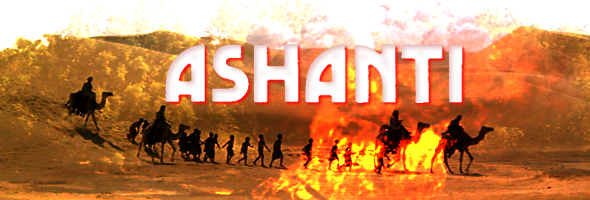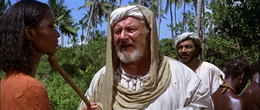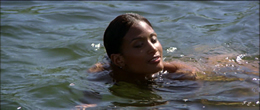
Color, 1979, 117m.
Directed by Richard Fleischer
Starring Michael Caine, Peter Ustinov, Kabir Bedi, Beverly Johnson, Omar Sharif, Rex Harrison, William Holden
Severin (Blu-Ray & DVD) (US R0 HD/NTSC) / WS (2.35:1) (16:9),
Arrow (DVD) (UK R2 PAL) / WS (2.35:1), Warner (UK R2 PAL)
 A disco-era look at modern international slavery, Ashanti came at the tail end of Hollywood's love affair with all-star action films, either of the disaster or espionage variety. Star Michael Caine was becoming something of a specialist in these films, with this one falling smack in between his appearances in The Swarm and Beyond the Poseidon Adventure, though really this fits more comfortably with the notorious one he made the following year: The Island. Here Caine plays Dr. David Linderby, a United Nations worker who goes on a medi
A disco-era look at modern international slavery, Ashanti came at the tail end of Hollywood's love affair with all-star action films, either of the disaster or espionage variety. Star Michael Caine was becoming something of a specialist in these films, with this one falling smack in between his appearances in The Swarm and Beyond the Poseidon Adventure, though really this fits more comfortably with the notorious one he made the following year: The Island. Here Caine plays Dr. David Linderby, a United Nations worker who goes on a medi cal mission to Africa with his wife, Anansa (Vogue cover model Johnson), who's also a doctor and loves swimming naked in the local river. As it turns out, David is also trying to expose the still-active slave trading going on the area, with beautiful women abducted and sold off to the highest bidder. A descendant of the area's Ashanti tribe, Anansa catches the eye of Suleiman (Ustinov), who has her snatched while David's back is turned. Of course, David immediately goes into vengeance mode and, determined to get his wife back, turns to some of the locals for help including a suave anti-slavery crusader (Harrison) and a gun-toting mercenary (Holden). However, his biggest ally is Malik (Bedi), who has his own score to settle with Suleiman. With Anansa about to be delivered to a sleazy rich Saudi prince (Sharif), can they get her back in time?
cal mission to Africa with his wife, Anansa (Vogue cover model Johnson), who's also a doctor and loves swimming naked in the local river. As it turns out, David is also trying to expose the still-active slave trading going on the area, with beautiful women abducted and sold off to the highest bidder. A descendant of the area's Ashanti tribe, Anansa catches the eye of Suleiman (Ustinov), who has her snatched while David's back is turned. Of course, David immediately goes into vengeance mode and, determined to get his wife back, turns to some of the locals for help including a suave anti-slavery crusader (Harrison) and a gun-toting mercenary (Holden). However, his biggest ally is Malik (Bedi), who has his own score to settle with Suleiman. With Anansa about to be delivered to a sleazy rich Saudi prince (Sharif), can they get her back in time?
Part mainstream globe-trotting adventure film and part exploitation trash, Ashanti features a cast far more qualified than one might expect. Ustinov manages to steal all of his scenes with a hammy performance that feels like his role from Spartacus rewritten by Bob Guccione, while Harrison and Holden basically have glorified cameos that got them out of England for a couple of weeks. Caine is his usually stoic, bullet-blasting self (again think of The Island for reference), while Johnson looks fantastic but doesn't have to do anything too strenuous in the thesping department. Perhaps the best performance comes from Bedi, a popular Indian actor who had just made the wildly successful miniseries Sandokan in Italy and would go on to star as a bad guy in Octopussy. He's easily the most intriguing character in the film, and one of the film's best decisions was making him Caine's primary ally. Interestingly, Caine was very vocal on multiple occasions about his displeasure with the film, calling it the worst he ever made. Yes, the star of Jaws: The Revenge actually said that.
Seen today, Ashanti is an entertaining example of glossy late '70s hokum, swift and efficient with almost no nutritional value whatsoever. Curiously it was directed by Richard Fleischer, who had made a very different look at slavery four years earlier with Mandingo and had just finished the rather good Crossed Swords (also with Harrison). Something of a talented gun for hire, Fleischer had built a solid career with a handful of indisputable classics like The Narrow Margin and 20,000 Leagues under the Sea as well as plenty of respectable programmers like Fantastic Voyage, Soylent Green, The Boston Strangler, 10 Rillington Place, and See No Evil. However, after this film his career took a really bizarre turn before he retired in the late '80s, ranging from a major musical misfire (the Neil Diamond version of The Jazz Singer) to wacko '80s matinee favorites like Amityville 3-D and Conan the Destroyer. You can see a bit of both of those sensibilities at work here as the film itself looks great (thanks to gorgeous scope lensing by Nights of Cabiria cinematographer Aldo Tonti) and keeps its multiple storylines and cast member
very different look at slavery four years earlier with Mandingo and had just finished the rather good Crossed Swords (also with Harrison). Something of a talented gun for hire, Fleischer had built a solid career with a handful of indisputable classics like The Narrow Margin and 20,000 Leagues under the Sea as well as plenty of respectable programmers like Fantastic Voyage, Soylent Green, The Boston Strangler, 10 Rillington Place, and See No Evil. However, after this film his career took a really bizarre turn before he retired in the late '80s, ranging from a major musical misfire (the Neil Diamond version of The Jazz Singer) to wacko '80s matinee favorites like Amityville 3-D and Conan the Destroyer. You can see a bit of both of those sensibilities at work here as the film itself looks great (thanks to gorgeous scope lensing by Nights of Cabiria cinematographer Aldo Tonti) and keeps its multiple storylines and cast member s juggling in the air without ever falling down, while the junkier aspects creep through thanks to some pretty sadistic violence and a funkalicious music score by famed pop keyboard player Michael Melvoin, who also scored the even more disco-centric The Main Event the same year.
s juggling in the air without ever falling down, while the junkier aspects creep through thanks to some pretty sadistic violence and a funkalicious music score by famed pop keyboard player Michael Melvoin, who also scored the even more disco-centric The Main Event the same year.
Despite its pedigree, Ashanti remains a lesser known entry for all of its participants, largely due to the collapse of the original plan to release it for Christmas in '78. In America it rarely popped up on television, though a really dire LP-speed VHS version popped up from budget label Interglobal (as Ashanti: Land of No Mercy). A truly cruddy bootleg popped up back in 2005 from the infamous Jef Films, most likely ripped from the first UK DVD from Warner, a wretched pan and scan job that demolished any visual appeal the film originally possessed. A non-anamorphic widescreen version eventually turned up in the UK in 2009 from Arrow, looking okay but not much better than you'd see on a standard def TV broadcast. The best of the bunch by a wide margin is the 2012 dual-format release from Severin, which includes both a DVD and a Blu-Ray with identical bonus features (and menus). This one wins by default as the only anamorphic version around, with the Blu-Ray edging out the DVD by a modest margin thanks to better compression and no annoying NTSC-based issues like edge halos and shimmering from time to time. However, don't expect a demo piece here as the Blu-Ray, though extremely colorful and correctly framed, still looks pretty soft and appears to have gone through some grain removal based on the very smooth look in many scenes and some slushy textures in close ups. It's nowhere near the overzealous smudging found on, say, Dementia 13, but it's definitely there if you're sensitive to it; since this isn't really a hallmark of any other Severin titles, it may have been endemic to the original master provided from the licensor. Otherwise, as said before it's a significant jump over prior versions and really makes for the first genuinely watchable edition of the film on home video, so plan accordingly. The standard Dolby Digital mono track sounds fine enough given the limited nature of the source, essentially the same on both discs. Extras include the theatrical trailer (non-anamorphic 2.35:1) and a 27-minute interview with Beverly Johnson, who still looks absolutely stunning. Whatever her secret is, it's definitely working. She talks about having to hide her pregnancy during the early portion of the film's shoot, replacing another actress for the lead role, being the first black woman on the cover of Vogue, having her costumes done by the great Edith Head, feeling nonchalant about her nude scenes, and working with all of her fellow actors, including some fun anecdotes about working with Ustinov. She also discusses naming her daughter after her character in the film (and losing her in a custody battle), which eventually led to the OWN reality series Beverly's Full House. That's right -- this movie inspired an Oprah TV show. It's a lively chat with an interesting perspective on the film (it's too bad the late Fleischer isn't around to talk about its more contentious production aspects), and anyone with a fondness for this decadent period in '70s cinema should find the whole package sinfully entertaining.